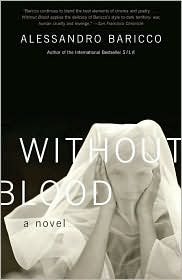
Baricco has a unique gift with words and an ability to enchant the readers with his stories. Every time I read one of his books I’m met with a new surprise, and it’s always a pleasant one.
The main protagonist in Without Blood is Nina. At the beginning of the story we meet her while hiding with her family in an old house in the countryside, in an anonymous country, during an unnamed civil war, which however reminds us of the Spanish.
Nina’s father, Manuel Roca, is not on the winning side, and he seems to have a lot of enemies, so they have to live in hiding to stay alive. But no matter how much they want to escape the past, one day it will catch up with them and the results will be devastating. Their enemies, headed by a man called Salinas, will track them down and a battle will ensue during which Manuel and his son will be killed. Little Nina however who during all this hustle was hidden in the basement will survive. And then…
And then the years swiftly go by, and there comes a time that Nina sets out to take her revenge. She’s afraid of nothing and of no one and she’s determined to spare no effort to reach her goal. And thus yesterday’s hunters become today’s prey.
Of course, as one would expect, in a Baricco story nothing is exactly the way it looks; the author seems to suggest that every coin has two different sides; but of course that doesn’t mean that the one voids the other. At the end of the day what counts the most are the facts; it is them that write the history, it is them that engrave the souls. It is them thus that engraved Nina’s soul, but they were not enough to completely rob her from her humanity, because even though she’s out for revenge she’s not willing to inflict more pain than the pain inflicted on her, while at sometime she reaches a certain point where she can stare with a clear eye on her enemies’ truths. Besides, as we read: “You cannot dream of a better world and think that it will be delivered just because you ask for it.” The world is what it is, the author seems to say, the past cannot change, but it’s nevertheless worth the trouble to fight to make today and tomorrow a little bit better, a bit more humane.
This is a well-written novella about the recurrent mistakes of men and their eternal passions.
The main protagonist in Without Blood is Nina. At the beginning of the story we meet her while hiding with her family in an old house in the countryside, in an anonymous country, during an unnamed civil war, which however reminds us of the Spanish.
Nina’s father, Manuel Roca, is not on the winning side, and he seems to have a lot of enemies, so they have to live in hiding to stay alive. But no matter how much they want to escape the past, one day it will catch up with them and the results will be devastating. Their enemies, headed by a man called Salinas, will track them down and a battle will ensue during which Manuel and his son will be killed. Little Nina however who during all this hustle was hidden in the basement will survive. And then…
And then the years swiftly go by, and there comes a time that Nina sets out to take her revenge. She’s afraid of nothing and of no one and she’s determined to spare no effort to reach her goal. And thus yesterday’s hunters become today’s prey.
Of course, as one would expect, in a Baricco story nothing is exactly the way it looks; the author seems to suggest that every coin has two different sides; but of course that doesn’t mean that the one voids the other. At the end of the day what counts the most are the facts; it is them that write the history, it is them that engrave the souls. It is them thus that engraved Nina’s soul, but they were not enough to completely rob her from her humanity, because even though she’s out for revenge she’s not willing to inflict more pain than the pain inflicted on her, while at sometime she reaches a certain point where she can stare with a clear eye on her enemies’ truths. Besides, as we read: “You cannot dream of a better world and think that it will be delivered just because you ask for it.” The world is what it is, the author seems to say, the past cannot change, but it’s nevertheless worth the trouble to fight to make today and tomorrow a little bit better, a bit more humane.
This is a well-written novella about the recurrent mistakes of men and their eternal passions.

No comments:
Post a Comment